Here’s how the school catch-up programme will work as the government announces £1 billion fund


The UK government has announced a £1 billion fund to help children in England who have missed out on months of school amid the coronavirus lockdown.
The programme aims to help children “catch up” on lost learning while schools have remained closed, ahead of their expected return to in-school education in September.
How will the catch-up programme work?
Advertisement
Advertisement
One-on-one, or small group, tuition will be targeted at up to two million of the most disadvantaged children at state schools across England from the start of the 2020/21 academic year.
Children will have access to tutors through a £350 million national programme, and the remaining £650 million will be shared among primary and secondary schools to help children from all backgrounds catch up on lost teaching time.
Head teachers will be able to decide how the money is spent, but the government expects it to be used for small group tuition for pupils who need it.
The funding can be used for summer schools, educational and mental health programmes, as well as extra teachers and school equipment, such as computers.
Advertisement
Advertisement
Announcing the funding on Thursday (18 June), Prime Minister Boris Johnson said: "I want to once again thank teachers, childcare workers and support staff for the brilliant work they have been doing throughout the pandemic.
"This £1bn catch-up package will help headteachers to provide extra support to children who have fallen behind while out of school.
"I am determined to do everything I can to get all children back in school from September, and we will bring forward plans on how this will happen as soon as possible."
Education Secretary Gavin Williamson said that the funding would help to ensure that young people from an array of backgrounds are given the education and opportunities they deserve.
Advertisement
Advertisement
He added that the move would bring “long-term reform to the educational sector that will protect a generation from the effects of this pandemic".
He said: "We cannot afford for any of our children to lose out as a result of COVID-19. The scale of our response must match the scale of the challenge.
"This package will make sure that every young person, no matter their age or where they live, gets the education, opportunities and outcomes they deserve, by spending it on measures proven to be effective, particularly for those who are most disadvantaged."
When will the funding be distributed?
Schools standards minister Nick Gibb said that the funding will begin to be distributed to schools from the start of the academic year, in September, and confirmed that head teachers will have the discretion to decide exactly how it is spent.
Advertisement
Advertisement
He said: "The money will start to be paid in the academic year starting in September.
"Schools will know it's coming and they will be able to budget on that basis if they want to do things before September.”
When will pupils go back to school?
Some primary school children in Reception, Year 1 and Year 6 have begun returning to classrooms in England, along with children in nursery.
Pupils in Year 10 and Year 12 also started to return to secondary schools and colleges this week.
Advertisement
Advertisement
However, all school pupils are not expected to return to classrooms until at least September, after the government was forced to abandon its plans to get all primary school children back in classes before the summer holidays.